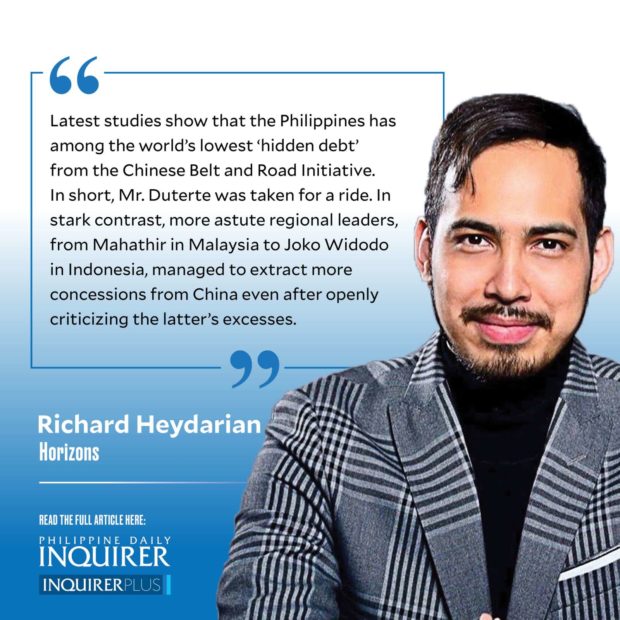After Duterte: Avoiding China’s ‘pledge trap’
The legendary French diplomat Charles Talleyrand described the strategic blunders of a contemporary leader thus: “It is worse than a crime, it is a mistake.” Geopolitical naivete, Talleyrand reckoned, could cost nations immeasurable damage.
When President Duterte came to power, he not only upended the country’s democratic institutions, he also revolutionized our foreign policy. Right off the bat, he engaged in an ostensibly commendable effort to diversify our strategic relations away from the US and improve ties with a powerful neighbor, China, in order to strengthen our bargaining position.
Under the populist in Malacañang, the Philippines no longer treated its relations with Washington as either special or sacrosanct, but instead in broadly transactional terms. Meanwhile, Mr. Duterte proactively courted Beijing to deescalate maritime tensions as well as attract large-scale investments.
The problem, however, is that Mr. Duterte fell into what can best be described as a “pledge trap,” whereby he forward-deployed geopolitical concessions in exchange for illusory gains. As a result, his successor will inherit a far weaker hand in dealing with China, which has yet to finalize a single big-ticket infrastructure investment in the Philippines while, more crucially, it has rapidly expanded its military and paramilitary footprint across our exclusive economic zone in recent years.
Both Mr. Duterte and his chief critics failed to understand China’s statecraft, especially vis-à-vis geopolitical neophytes. While the President fawned over imaginary gains from Beijing, openly saying we should be “meek” in exchange for “mercy,” opposition leaders, in turn, panicked over the prospect of a “debt trap.”
As I warned throughout the years, both sides got it wrong. In an interview with Bloomberg on the sidelines of the Shangri-La Dialogue in 2018 (“China Hasn’t Delivered on Its $24 Billion Philippines Promise”), I highlighted the dearth of actual commitments on the ground. Before that, in a guest column in these pages
(“Duterte’s Chinese chimera,” 4/16/2018), I cautioned our leaders about “a huge gap between Chinese pledges of investments, on one hand, and the actual amount delivered, on the other.”
My analysis was based on a careful study of trendlines in Chinese overseas investment strategy throughout the opening decades of the 21st century. In places such as the Middle East, for instance, Beijing often made pledges that were five to ten times larger than the actual investments, which were almost always delayed and coupled with huge concerns over quality, overreliance on Chinese labor, and good governance standards.
Based on extensive interviews with top leaders in the region in recent years, it also became clear to me that even the much-vaunted Belt and Road Initiative (BRI) continues to be riddled with similar concerns.
When I asked former Malaysian prime minister Mahathir Mohamad about his fears of a “new colonialism,” he told me that “owing too much money to China” could risk “diminishing the freedom of action of other countries.”
What’s incredible in the case of the Philippines, however, is that Mr. Duterte diminished the country’s strategic elbow room even in the absence of the large-scale investment deals that poured into neighboring Malaysia.
Overwhelmed by China’s “pledges” of multibillion investments, the mayor-turned-President eagerly “set aside” (his words) our arbitration award victory at The Hague, lambasted our allies, and largely refrained from criticizing the creeping invasion of our waters.
But in his final months in office, Mr. Duterte can’t pinpoint even a single major concession by China in the West Philippine Sea, where an armada of Chinese paramilitary vessels have been harassing Filipino troops and fishermen on a regular basis.
Neither can he point out any real big-ticket investment by his strategic patron. This is why latest studies show that the Philippines has among the world’s lowest “hidden debt” from the Chinese BRI.
In short, Mr. Duterte was taken for a ride.
In stark contrast, more astute regional leaders, from Mahathir in Malaysia to Joko Widodo in Indonesia, managed to extract more concessions from China even after openly criticizing Beijing’s excesses. When you firmly stand your ground, Beijing respects you.
The next Philippine president will have to avoid the same strategic blunders. When it comes to cooperation with China, we need a more “results-oriented” foreign policy and less of the geopolitical amateur hour we’ve seen from this administration.





















